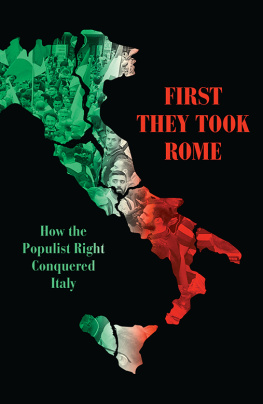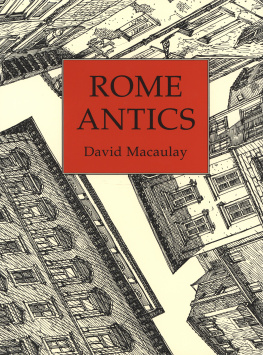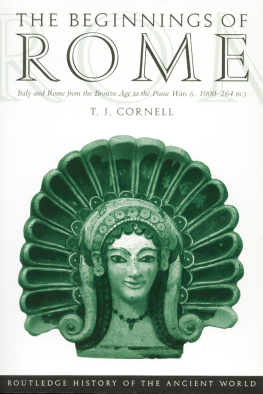David Broder - First They Took Rome: How the Populist Right Conquered Italy
Here you can read online David Broder - First They Took Rome: How the Populist Right Conquered Italy full text of the book (entire story) in english for free. Download pdf and epub, get meaning, cover and reviews about this ebook. year: 2020, publisher: Verso Books, genre: Politics. Description of the work, (preface) as well as reviews are available. Best literature library LitArk.com created for fans of good reading and offers a wide selection of genres:
Romance novel
Science fiction
Adventure
Detective
Science
History
Home and family
Prose
Art
Politics
Computer
Non-fiction
Religion
Business
Children
Humor
Choose a favorite category and find really read worthwhile books. Enjoy immersion in the world of imagination, feel the emotions of the characters or learn something new for yourself, make an fascinating discovery.
- Book:First They Took Rome: How the Populist Right Conquered Italy
- Author:
- Publisher:Verso Books
- Genre:
- Year:2020
- Rating:4 / 5
- Favourites:Add to favourites
- Your mark:
- 80
- 1
- 2
- 3
- 4
- 5
First They Took Rome: How the Populist Right Conquered Italy: summary, description and annotation
We offer to read an annotation, description, summary or preface (depends on what the author of the book "First They Took Rome: How the Populist Right Conquered Italy" wrote himself). If you haven't found the necessary information about the book — write in the comments, we will try to find it.
David Broder: author's other books
Who wrote First They Took Rome: How the Populist Right Conquered Italy? Find out the surname, the name of the author of the book and a list of all author's works by series.
First They Took Rome: How the Populist Right Conquered Italy — read online for free the complete book (whole text) full work
Below is the text of the book, divided by pages. System saving the place of the last page read, allows you to conveniently read the book "First They Took Rome: How the Populist Right Conquered Italy" online for free, without having to search again every time where you left off. Put a bookmark, and you can go to the page where you finished reading at any time.
Font size:
Interval:
Bookmark:

FIRST THEY
TOOK ROME
How the Populist Right Conquered Italy
David Broder

First published by Verso 2020
David Broder 2020
All rights reserved
The moral rights of the author have been asserted
1 3 5 7 9 10 8 6 4 2
Verso
UK: 6 Meard Street, London W1F 0EG
US: 20 Jay Street, Suite 1010, Brooklyn, NY 11201
versobooks.com
Verso is the imprint of New Left Books
ISBN-13: 978-1-78663-761-1
ISBN-13: 978-1-78663-763-5 (UK EBK)
ISBN-13: 978-1-78663-764-2 (US EBK)
British Library Cataloguing in Publication Data
A catalogue record for this book is available from the British Library
Library of Congress Cataloging-in-Publication Data
A catalog record for this book is available from the Library of Congress
Typeset in Adobe Garamond Pro by Hewer Text UK Ltd, Edinburgh
Printed and bound by CPI Group (UK) Ltd, Croydon CR0 4YY
Contents
AN Alleanza Nazionale (National Alliance; postfascist, 19942009)
CDU Christlich Demokratische Union (Christian Democratic Union; centre-right, 1945present)
CSU Christlich-Soziale Union (Christian Social Union; centre-right, 1945present)
DC Democrazia Cristiana (Christian Democracy; big tent, 194294)
DP Democrazia Proletaria (Proletarian Democracy; far-left, 197591)
DS Democratici di Sinistra (Democrats of the Left; centre-left, 19982007)
FdI Fratelli dItalia (Brothers of Italy; postfascist, 2014present)
FI Forza Italia (centre-right/Berlusconian, 19942009, 2013present)
IdV Italia dei Valori (Italy of Values; centre-left, anti-corruption, 1998present)
LeU Liberi e Uguali (Free and Equal; centre-left, 2017present)
M5S Movimento Cinque Stelle (Five Star Movement; big tent, anti-corruption, 2009present)
MSI Movimento Sociale Italiano (Italian Social Movement; neofascist, 194695)
NAR Nuclei Armati Rivoluzionari (neofascist, 197781)
NCD Nuovo Centrodestra (centre-right, 201317)
PaP Potere al Popolo (Power to the People)
PCI Partito Comunista Italiano (Italian Communist Party, 192191)
PD Partito Democratico (Democratic Party)
PdCI Partito dei Comunisti Italiani (Party of Italian Communists; communist, 1998present)
PdL Popolo della Libert (People of Freedom, centre-right/Berlusconian, 200913)
PDS Partito Democratico della Sinistra (Democratic Party of the Left; centre-left, 199198)
PRC Partito della Rifondazione Comunista (Communist Refoundation Party; communist, 1991present)
PSDI Partito Socialista Democratico Italiano (Italian Democratic Socialist Party; centre-left, 194798)
PSI Partito Socialista Italiano (Italian Socialist Party; centre-left, 18921994)
RC Rivoluzione Civile (Civic Revolution, far-left, anti-corruption, 2013)
SEL Sinistra Ecologia Libert (Left Ecology Freedom; centre-left, 200916)
SPD Sozialdemokratische Partei Deutschlands (Social Democratic Party; centre-left, 1875present)
UU Uniti nellUlivo (United in the Olive Tree; centre-left, 200407)
As an English resident of Rome, I never cease to hear middle-class Italians singing the praises of a normal country Britain. Seen from Italy, ours is a land of efficient bus services, friendly locals offering up trays of tea and cakes, and earnest professionalism in public life. When one recent Italian president came under criticism in a wiretapping scandal, the countrys leading newspaper lamented the absence of the businesslike respect that supposedly characterises exchanges in the House of Commons.
This isnt the only curious model. As Italy prepared to join the eurozone, one leading editor at La Repubblica issued a book entitled Germanizzazione, characterising the single currency as a German takeover but saying this was a good thing. Mario Monti, who became prime minister in 2011, concurred that if Italy was to become a normal country it would require some external bind what he called denying our own selves a little. What seemed least of all normal in such comments was their obsession with foreign models.
Perhaps we should instead question the idea that Italy is really so unusual. Studies of Italian political history often present it as a patchwork of cultural peculiarities, the anomalous result of late national unification and its position on the periphery of Europe. Yet, in the age of Brexit and Donald Trump, the volatility and fragmentation of Italian public life no longer seem unique. Today, its institutional turmoil is rather less a mark of backwardness and more like a vision of our own future.
Former Trump aide Steve Bannon recognised this in October 2018 when he chose to site his populist academy at a monastery near Rome what he called the centre of the political universe. He came to Italy to learn from Matteo Salvini, the latest leader to turn the countrys politics upside down. After almost three decades in which democratic institutions have withered, Salvini has not just turned his Lega into an all-Italian force but polarised the entire political field around his nationalist agenda.
The last thirty years of turmoil have, indeed, made volatility the new normal in Italian public life. Its parties change names constantly; leading political personnel are prone to outrageous antics; and Italians love to talk about the idiosyncrasies that supposedly make this country beyond comparison. Yet, underneath the noise and colour is a simpler reality a major industrialised power, with deep-rooted democratic traditions that has, in recent decades, sunk into profound economic stagnation and political tumult.
Some commentators tell us that things were always like this that Italy was forever backward and dysfunctional, that it never got over fascism, or that this land of functional illiterates has been prey to demagogues ever since Caesar. Yet what is happening today really is new. In the postwar decades, Italy enjoyed such rapid economic growth that it even surpassed British GDP per capita; its anomaly was precisely that it had a permanent party of government as well as the Wests largest Communist Party, in opposition.
Yet, if this was the normality even into the 1980s, today the opposite holds true. The Second Republic inaugurated after the end of the Cold War has instead seen one of Europes best-performing economies turn into among the weakest, with dismal investment, withering infrastructure, and around a third of young people neither in work nor study. This shift is also reflected in political turmoil, with no force able to impose itself in an enduring way.
In the 1990s, many insisted that the modernisation of Italy relied on the external bind provided by the European project. Italy was, at that point, one of the most federalist countries, seduced by the prospect of becoming a normal country. Back then, not only the liberal centre-left but the Lega Nord and Silvio Berlusconi held up the EU as a force that would heal Italys public finances and improve its political culture. Yet, in 2020, Italians Euroscepticism today rivals even that of their British counterparts.
Europe can little withstand a mounting climate of Italian disaffection. The third-largest eurozone economy, an Italian default or exit from the single currency would spoke wide-scale turmoil. Yet the necessary relief through debt cancellation would jeopardise the eurozones most fundamental dogmas. Both Too Big to Fail and Too Big to Save, Italy is instead condemned to a permanent crisis-management regime, outright collapse forever kicked a few months down the road.
Font size:
Interval:
Bookmark:
Similar books «First They Took Rome: How the Populist Right Conquered Italy»
Look at similar books to First They Took Rome: How the Populist Right Conquered Italy. We have selected literature similar in name and meaning in the hope of providing readers with more options to find new, interesting, not yet read works.
Discussion, reviews of the book First They Took Rome: How the Populist Right Conquered Italy and just readers' own opinions. Leave your comments, write what you think about the work, its meaning or the main characters. Specify what exactly you liked and what you didn't like, and why you think so.












